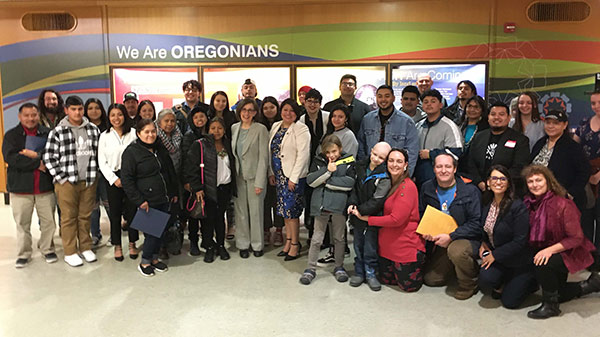SB 1602 Makes a Difference for Rural Oregonians Sick of Pesticide Drift
When Allie McDermott and her partner heard the helicopter blades whirring early on a Sunday morning in March, they were stunned. As they ran up the road to see for themselves they thought, ‘There is just no way a helicopter is spraying herbicides early on a Sunday morning!’
As it happened Pacific Air Research snuck in on the weekend, more than 24 hours before a state forester was assigned to observe the aerial application. The intent was to spray 113 acres with Atrazine 4L and Velpar DF from the air without any agency oversight.
These are both dangerous chemicals. The US EPA states that Atrazine and Velpar (active ingredient Hexazinone) can easily contaminate ground and drinking water. Both are highly toxic to aquatic life. Velpar can cause irreversible eye damage. Atrazine is a known human hormone disruptor associated with decreasing sperm counts in animals and birth defects in people. No one would want these poisons sprayed near their homes and farms.
Unfortunately, all this took place three months shy of pesticide protections provided by Senate Bill 1602, which passed nearly unanimously in the Oregon Legislature on June 26th. This landmark law will addresses aerial pesticide spray issues faced by McDermott and hundreds of the other rural Oregonians who have reached out to Beyond Toxics over the past 18 years.
SB 1602 mandates that residents living near planned spray operations can request and will receive an email alert 24 hours before an aerial spray. No more helicopters sneaking in to spray at sunrise on a Sunday morning, unscheduled and unannounced! With this real-time notification, nearby residents can leave the area temporarily or prepare their families, take precautions to protect their pets and livestock, and collect water and soil samples before and after a spray operation if they wish. Pesticide applicators and timber land owners will receive hefty fines if they disobey the law.
The bill mandates larger protective buffer zones for homes, schools and drinking water intakes, more than 5 times what was previously required in statute.
Another strong point of SB 1602, rural residents are now legally entitled to their ‘right-to-know’ before a helicopter arrives on the scene. With the passage of SB 1602, Oregon has finally adopted human health and environmental laws more closely aligned with pesticide protections required in other western states.
McDermott is also an organic blueberry farmer. We believe she has every right to ensure that no herbicide spray drift reaches an organic food crop. Her ability to run a certified organic business should never be jeopardized by industrial timber business practices. Beyond Toxics fights to protect organic farmers like Allie McDermott who are working hard to provide healthy, non-toxic food for their communities.
SB 1602 is a compilation of legislative initiatives Beyond Toxics has introduced over the past five years. Based on a decade of grassroots organizing across Oregon, we brought forward a wide variety of pressing issues for legislative review and supported many dozens of rural residents in their efforts to testify at the State Capitol to demand protections from aerial pesticide spray. Our early wins to reform the Oregon Forest Practices Act set the stage for the passage of SB 1602.
After their experience, McDermott and her family are eager to see more legal protections from aerial herbicide drift. Reflecting on the new legislation in one of our recent conversations, she felt a sense of relief. “We need laws like SB 1602 because corporate timber companies just want to increase their profits by decreasing their accountability.”

